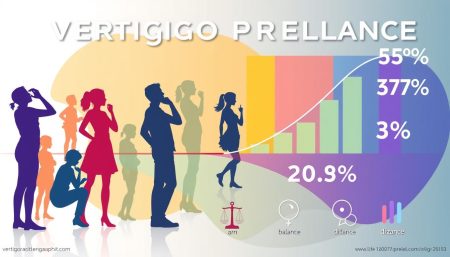Vertigo can hit you out of nowhere, making your world spin. It’s a balance disorder that affects millions, making them feel like they’re moving when they’re not. Many are curious about its dangers and how to recognize its symptoms.
In this guide, we’ll look at the main signs of vertigo and how it affects daily life. We’ll also talk about serious risks. You’ll learn about common causes, like inner ear problems and migraines, and how to manage them. We’ll discuss when to get medical help for this unsettling condition.
Understanding vertigo is key for those who have it and their families. Let’s explore this complex balance disorder together and uncover its secrets.
Understanding Vertigo: More Than Just Dizziness
Vertigo is not just feeling dizzy. It’s a complex balance disorder that affects daily life. People with vertigo feel like the world is spinning, even when it’s not.
Vertigo vs. General Dizziness
Dizziness is a broad term, but vertigo is more specific. Dizziness might make you feel lightheaded or unsteady. Vertigo, however, creates a false sense of motion.
This balance disorder causes intense spinning sensations, nausea, and loss of balance.
Daily Life with Vertigo
Vertigo makes simple tasks hard. Getting out of bed, walking, or watching TV can trigger symptoms. Some people struggle to work or drive.
Social activities become difficult, leading to isolation and stress.
Balance and Spatial Orientation
Vertigo deeply affects balance. It messes with your brain’s ability to understand space. This can cause:
- Difficulty walking straight
- Increased risk of falls
- Problems with hand-eye coordination
- Confusion about your position in space
Understanding vertigo is key to managing it. If you have persistent dizziness or spinning, get medical help. They can find the cause and suggest treatments.
Common Signs and Symptoms of Vertigo
Vertigo symptoms can be very disturbing. Knowing these signs helps you act fast. The main sign is a feeling of spinning, often with dizziness.
People with vertigo might feel like they’re moving, even when they’re not. They might also see things spinning around them. This can make it hard to balance and can cause nausea and vomiting.
Other common vertigo symptoms include:
- Headache or migraine
- Sweating
- Ringing in the ears (tinnitus)
- Abnormal eye movements
- Feeling of fullness in the ear
The severity and how long these symptoms last can vary. Some people have short episodes, while others have them for hours or days. Spotting these signs early is key for getting the right treatment.
| Symptom | Description | Frequency |
|---|---|---|
| Spinning sensation | Feeling of rotation or movement | Very common |
| Dizziness | Lightheadedness or disorientation | Common |
| Nausea | Feeling sick to stomach | Common |
| Balance problems | Difficulty maintaining stability | Common |
| Tinnitus | Ringing or buzzing in ears | Less common |
If you’re experiencing these symptoms, especially if they’re bad or keep coming back, see a doctor. They can find out why you’re feeling this way and suggest the best treatment.
Is Vertigo Dangerous? Understanding the Risks
Vertigo can be more than just a nuisance. You might wonder, “Is vertigo dangerous?” It’s not always a serious threat, but it does come with risks. We’ll look at the dangers and when you should get treatment.
Immediate Safety Concerns
Vertigo can cause you to fall and get hurt. Imagine feeling dizzy while walking up stairs or crossing a busy street. These situations show why vertigo can be risky.
- Increased risk of falls, especially in older adults
- Potential for workplace accidents
- Dangers while driving or operating machinery
Long-term Health Implications
Long-term vertigo can affect your health and life quality. It might cause:
- Anxiety and depression
- Reduced physical activity
- Social isolation
Getting the right treatment for vertigo is key to avoiding these problems. Treatments include medicines and exercises to help manage symptoms.

When Vertigo Becomes an Emergency
Most vertigo isn’t serious, but some symptoms need quick medical help:
| Emergency Symptoms | Possible Causes |
|---|---|
| Sudden, severe headache | Stroke or brain hemorrhage |
| Double vision or vision loss | Neurological issues |
| Difficulty speaking | Stroke |
| Weakness in limbs | Multiple sclerosis or stroke |
If you have these symptoms with vertigo, go to the emergency room right away. Quick treatment can stop serious problems and help your health.
Primary Causes of Vertigo Episodes
Vertigo can be caused by many things, from small problems to serious health issues. Knowing what causes vertigo is key to finding the right treatment. Let’s look at the main reasons for those dizzy spells.
Benign Paroxysmal Positional Vertigo (BPPV)
BPPV is the top reason for vertigo. It happens when tiny calcium crystals in your inner ear move out of place. These crystals send wrong signals about your head’s position. This leads to short but intense dizzy spells, especially when you move your head.
Inner Ear Infections and Inflammation
Your inner ear is crucial for balance. If it gets infected or inflamed, vertigo can occur. Knowing the signs of ear infections early can stop vertigo. Conditions like labyrinthitis and vestibular neuritis affect the inner ear and nerves nearby.
Vestibular Migraines and Neural Causes
Vestibular migraines are a special kind of migraine that can cause vertigo. They might not always bring headaches. Instead, they mainly mess with your balance system. Other causes include Meniere’s disease, with fluid buildup in the inner ear, and acoustic neuromas, rare tumors on the vestibular nerve.
| Cause | Main Symptoms | Duration |
|---|---|---|
| BPPV | Brief spinning sensation with head movement | Seconds to minutes |
| Inner Ear Infections | Vertigo, hearing loss, ear pain | Days to weeks |
| Vestibular Migraines | Vertigo, sensitivity to motion, nausea | Hours to days |
Knowing the main causes of vertigo helps you find what might be triggering it. If vertigo keeps happening, seeing a doctor is a must. They can help figure out what’s going on and how to treat it.
Diagnosing Vertigo: Medical Tests and Procedures
Diagnosing vertigo involves a series of tests to find the cause of your symptoms. Your doctor will start with a thorough physical exam and review of your medical history. This helps identify potential inner ear problems or other factors contributing to your vertigo.
One common test is the Dix-Hallpike maneuver. Your doctor will guide you through specific head movements to trigger vertigo symptoms. This test helps diagnose Benign Paroxysmal Positional Vertigo (BPPV), a frequent cause of vertigo.
Balance tests play a crucial role in vertigo diagnosis. These may include:
- Romberg test: Standing with eyes closed to assess balance
- Fukuda-Unterberger test: Marching in place with eyes closed
- Electronystagmography (ENG): Measuring eye movements during balance challenges
For more complex cases, your doctor might recommend imaging studies. MRI or CT scans can reveal structural issues in the brain or inner ear that may be causing your vertigo symptoms.
In some instances, blood tests might be necessary to rule out underlying conditions affecting your balance. These tests, combined with your symptoms and medical history, guide your healthcare provider in developing an effective vertigo treatment plan tailored to your specific needs.
Treatment Options for Managing Vertigo
Effective vertigo treatment can greatly improve your life. Medical experts offer many ways to manage symptoms and prevent future episodes. Let’s look at some common strategies for vertigo relief.
Medication-Based Approaches
Doctors may give you medicines to help with vertigo. These can include antihistamines, anti-nausea drugs, or diuretics. Some medicines help by reducing fluid in the inner ear. Others target specific conditions that cause vertigo.

Physical Therapy and Exercises
Vestibular rehabilitation therapy is a key part of preventing vertigo. This special physical therapy helps your brain better process balance signals. Exercises might include head movements, eye exercises, and balance training. These can help reduce dizziness and improve stability.
Lifestyle Modifications
Simple changes in your daily habits can help manage vertigo. These may include:
- Avoiding sudden head movements
- Getting up slowly from lying or sitting positions
- Staying hydrated
- Managing stress through relaxation techniques
- Limiting alcohol and caffeine intake
By using these treatment approaches together, many people find relief from vertigo symptoms. They also have fewer episodes over time. Always talk to a healthcare professional to find the best treatment plan for you.
Prevention Strategies and Lifestyle Changes
Preventing vertigo can make your life better. Simple changes in diet, environment, and exercise can help. These steps can lower your chance of getting vertigo and help manage balance issues.
Dietary Considerations
Your diet affects your risk of vertigo. Eating less salt helps keep your inner ear fluids balanced. Also, avoid foods like caffeine, alcohol, and processed snacks to prevent vertigo.
Environmental Modifications
Creating a safe home is key for those with balance issues. Remove tripping hazards, install handrails, and ensure good lighting. These steps can prevent falls and injuries during vertigo episodes.
Exercise and Balance Training
Regular exercise is important for preventing vertigo. Include activities like tai chi or yoga in your routine. These activities strengthen your core and improve stability, reducing vertigo-related falls.
- Practice standing on one foot
- Try walking heel-to-toe in a straight line
- Perform gentle head rotation exercises
Consistency is crucial in preventing vertigo. By adopting these lifestyle changes, you can reduce vertigo episodes and improve your balance and well-being.
Living with Vertigo: Coping Mechanisms and Support
Dealing with vertigo symptoms can be tough, but there are ways to manage it. Learning coping strategies and finding support can greatly improve your life.
Stress management is key in managing vertigo. Deep breathing, meditation, and yoga can help lower anxiety and reduce vertigo episodes. Regular exercise, tailored to your abilities, can also improve balance and well-being.
Support groups are a great resource for those with vertigo. Sharing experiences with others can offer emotional support and practical tips for managing symptoms.
“Joining a vertigo support group was a game-changer for me. I learned so much from others and no longer felt alone in my struggles.”
Keeping a vertigo journal can help you track your symptoms and treatments. Write down your symptoms, activities, and any triggers to share with your doctor.
| Coping Strategy | Benefits |
|---|---|
| Stress management techniques | Reduces anxiety, minimizes vertigo episodes |
| Support groups | Emotional support, practical tips |
| Vertigo journal | Identifies triggers, tracks treatment effectiveness |
| Adaptive devices | Improves safety, increases independence |
Adaptive devices like walking aids or home modifications can make you safer and more independent. Remember, managing vertigo is a journey. Finding the right coping strategies may take time and patience.
When to Seek Professional Medical Help
Vertigo can be a minor annoyance or a serious issue. It’s important to know when to get help. This ensures you get the right treatment and stay healthy.
- Sudden, severe vertigo with no apparent cause
- Vertigo accompanied by severe headache or neck pain
- Loss of consciousness or fainting spells
- Difficulty speaking or walking
- Double vision or sudden hearing loss
These signs might mean you need urgent care. If you’re dealing with vertigo that won’t go away, see a doctor if:
- Vertigo makes it hard to do daily tasks
- Symptoms last more than a week
- You’ve had head trauma or ear issues before
For vertigo treatment, think about seeing specialists. ENT doctors, neurologists, or vestibular therapists can help. They’ll create a plan just for you.
“Early intervention in vertigo cases can significantly improve outcomes and quality of life for patients.”
While vertigo itself might not be dangerous, ignoring it can cause problems. If you’re worried about your vertigo, get professional help.
Vertigo in Special Populations: Children and Elderly
Vertigo can hit anyone, but kids and seniors face special hurdles. Kids might not be able to say how they feel, making it hard to get help early. Parents should look out for signs like falling a lot, being clumsy, or saying they feel like they’re spinning.
For seniors, vertigo is a big risk. As people get older, their ears and muscles change, making falls more likely. Seniors might have other health issues that make finding and treating vertigo harder. It’s important for caregivers to spot vertigo signs like sudden balance loss or feeling off-balance.
Doctors need to be careful when diagnosing vertigo in kids and seniors. Kids get special tests to check their balance and coordination. For older adults, doctors look for other health problems that might cause similar symptoms.
Treatment plans differ based on age and health. Kids might do exercises to help their balance. Seniors might need medicine, physical therapy, and changes to make their homes safer to manage vertigo and prevent falls.
“Understanding age-specific vertigo presentations is key to effective management and improved quality of life for both young and old patients.”
By focusing on the unique needs of kids and seniors, doctors can help everyone with vertigo. This ensures safer, more comfortable lives for those dealing with this tricky balance disorder.
Future Developments in Vertigo Research and Treatment
The field of vertigo treatment is moving fast. Scientists are finding new ways to diagnose and manage it. Virtual reality technology is one area they’re exploring.
It might help patients improve their balance better. This could lead to better ways to prevent vertigo.
Researchers are also studying genetic factors that might cause vertigo. By understanding these genes, doctors could create targeted therapies. This could make vertigo treatment more effective for many people.
Brain stimulation techniques are another area of focus. These methods aim to fix the balance-related neural pathways. Early studies show they might reduce vertigo symptoms.
As research goes on, we might see these treatments more often in clinics. This is an exciting time for those dealing with vertigo.
Wearable devices are also being developed to help with vertigo. These gadgets could warn users of potential triggers and suggest treatments. Such innovations could change how we prevent and manage vertigo, giving patients more control over their symptoms.
FAQ
Q: Is vertigo a life-threatening condition?
A: Vertigo itself is usually not life-threatening. But, it can cause falls or accidents. In rare cases, it might be a sign of a serious condition that needs quick medical help.
Q: How long do vertigo episodes usually last?
A: Vertigo episodes can last from seconds to days. The time depends on the cause of vertigo.
Q: Can vertigo be cured completely?
A: It depends on the cause of vertigo. Some, like Benign Paroxysmal Positional Vertigo (BPPV), can be treated well. Others might need ongoing care.
Q: What are the most common causes of vertigo?
A: Common causes include BPPV, ear infections, vestibular migraines, and Meniere’s disease. Less common causes are neurological issues or certain medications.
Q: How is vertigo diagnosed?
A: Doctors use medical history, physical exams, and tests to diagnose vertigo. Tests include balance and hearing tests, and sometimes imaging like MRI or CT scans.
Q: What treatments are available for vertigo?
A: Treatments include medications, vestibular rehabilitation, and specific maneuvers for BPPV. Surgery is sometimes needed. The best treatment varies by cause.
Q: Can vertigo be prevented?
A: Not all vertigo can be prevented. But, staying healthy, managing stress, avoiding triggers, and doing balance exercises can help.
Q: When should I seek emergency medical care for vertigo?
A: Get emergency care if vertigo comes with severe headache, chest pain, trouble breathing, sudden weakness, slurred speech, or loss of consciousness. These signs need urgent care.
Q: Are there any home remedies for managing vertigo symptoms?
A: Home remedies include staying hydrated, avoiding sudden movements, using good lighting, and relaxing. But, see a doctor for proper diagnosis and treatment.
Q: Can children experience vertigo?
A: Yes, children can have vertigo, though it’s less common. Causes include ear infections, migraines, or rare neurological conditions. Children with vertigo need a pediatrician or specialist’s evaluation.


















